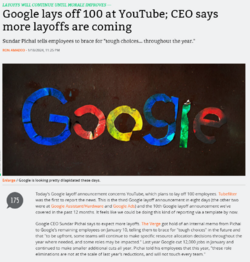We're in a bust cycle but it'll be back to boom soon, because unprecedented opportunities have opened up. It always, always takes a couple of years for people to figure these things out, but someone will, and they will become endlessly rich.
Google has absolutely dominated the search engine market for 20+ years, with no meaningful competition.
10 years ago, if you said "Google search sucks so bad, we need a replacement right away," you were probably talking about privacy and tracking.
Fundamentally, privacy concerns motivated only a small number of people. Privacy was not close enough to the core value proposition of Google for normies to care. The core value was being able to find what you wanted to find on the internet, and Google would do that for you very competently (for the low, low price of all your data).
Today, if you say "Google search sucks so bad, we need a replacement right away," you're talking about the fact that the search results you came for are terrible, irrelevant, and low-quality. The core value of the product has been hollowed out.
One of the core pieces of knowledge they impart to startup founders is this:
Fall in love with the problem you are solving, not the solution you are designing.
Google fell in love with its own way of doing things, because so much was invested in it that they couldn't see another way to do search. Now, they find their search results simply cannot stop being filled with garbage, because they stopped caring about the actual problem search solves (finding what you want on the internet) and became married to their solution (spidering every possible web result and listing as much as possible).
This presents untold opportunity to anyone who wants to take on the challenge of providing valuable search results.
What AI really means (and Google hasn't figured it out, and probably won't until the first next-gen competitor gets big enough by 2027 or 2028 ) is that the era of searching "the whole internet" is coming to an end. When most of the internet is garbage AI content, and AI can't be reliably scanned for by other AI tools (many researchers claim accurate AI-scanning-for-AI is mathematically impossible), this is an inevitability.
The Library of Alexandria notoriously was on a mission to collect every text in the world. If you were on a ship that docked in Alexandria and had texts onboard that they did not already have, you were required to relinquish them so they could be hand-copied and returned to you. They could persist in a mission this broad because the number of texts being created in the world was so low.
Trying to have a library with every text in the world would have become near-impossible within a century or so of the movable type printing press. By the time self-publishing houses existed that could put any old crap into the world with a near-zero barrier to entry, such a mission would have been not only difficult, but foolish: you'd probably be adding 10 terrible texts for every one that had value.
We've hit the same point in search, but so far, Google remains ignorant, trying to be the Library of Alexandria in an era where that mission simply means they are a garbage dump with occasional valuable content sprinkled in amidst the trash.
Generation is no longer valuable in an era of generative AI. The only thing that matters is curation, just like with the libraries.
Soon enough, a competitor will show up who curates search results with an actual human process for approving/rejecting search results, including forcing anyone submitting potential pages for curation to sign an agreement not to directly use generative AI for content creation or change the content significantly without resubmission.
The internet will become a village of walled gardens, each used for specialized searches about a specific area of knowledge, with people venturing into the untamed Google swamp only when they're willing to wade through hundreds of dull AI retreads in hopes of finding buried treasure. The first person to make a really good walled garden village will become one of the first tech billionaires of the new web era.







